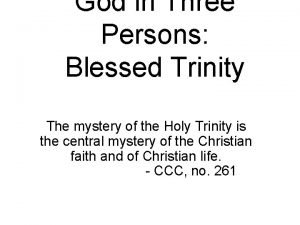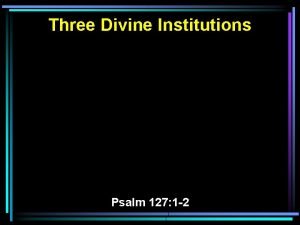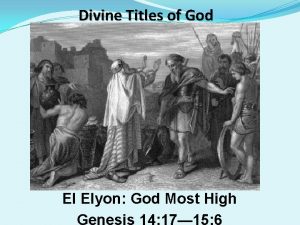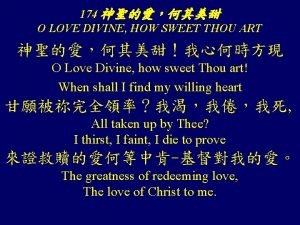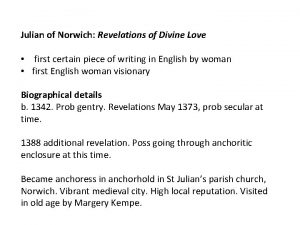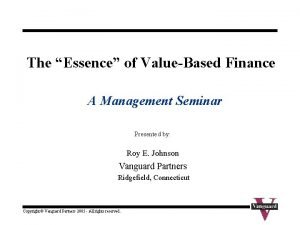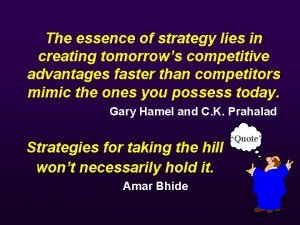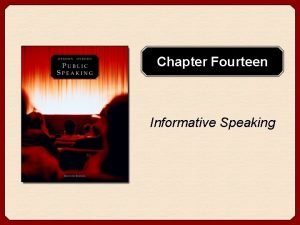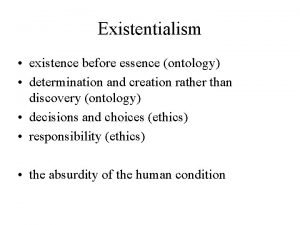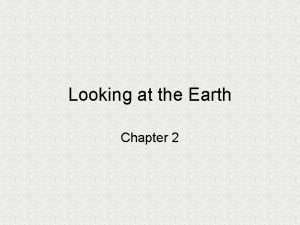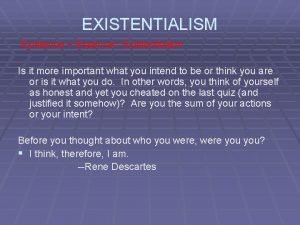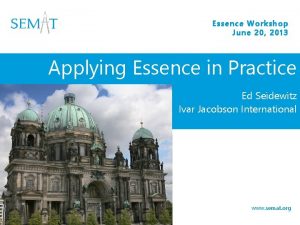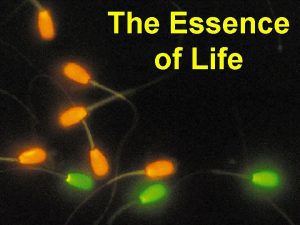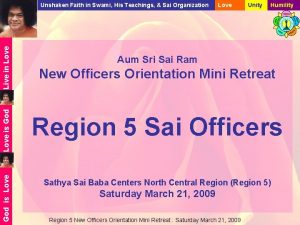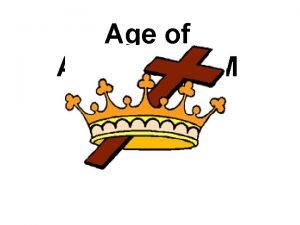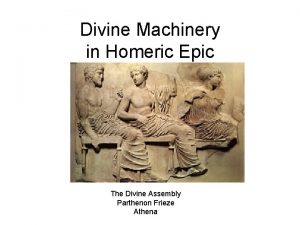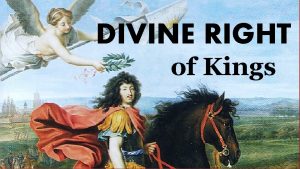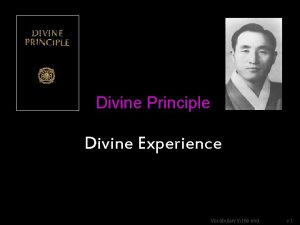Divine Love The essence of God is love

























































- Slides: 57

Divine Love “The essence of God is love and The Sufi Path is path of love. Love is to see what is good and beautiful in everything. It is to learn from everything, to see the gifts of God and the generosity of God in everything. It is to be thankful for all God's bounties. This is the first step on the road to the love of God. This is just a seed of love. In time, the seed will grow and become a tree and bear fruit. Then, whoever tastes of that fruit will know what real love is. It will be differently for those who have tasted to tell of it to those who have not”. Muzaffer Ashki al-Halveti al-Jerrahi (1916 -1985)

Premordial Covent And when your Lord brought forth from the children of Adam, from their backs, their descendants, and made them bear witness against their own souls: Am I not your Lord? They said: Yes! we bear witness. Lest you should say on the day of resurrection: Surely we were heedless of this”. Quran 7: 172, Shakir

Hadith Qudsi “I was a Hidden Treasure, and loved to be known intimately, so I created the Heavens and the Earth, so that they may come to intimately know me”.

Sufis: Love of God&Mankind • All people are the children of God on earth “ Oh God! I bear witness that all Thy creatures are brothers”Hadith “ Why this meaningless talk about the believer, the kafir, the obedient, the sinner, the rightly guided, the misdirected, the Muslim, the pious, the infidel, the fire worshipper? All are like beads in a rosary. ” Abdul Quddus of Gangoh

Sufis: Love of God&Mankind • Adopt the ways of God • To reflect in one’s own thought and activity the attributes of God. “ Higher spiritual life is nothing but service of humanity, It is not (chanting) the rosary, (remaining on the) prayer carpet or (wearing) coarse garments. ”Nizamuddin To identy service of God with the service of man


Sufis: Love of God&Mankind • Unity of Divine Revelation. “Say: We make no difference between them (prophets of God)”Quran: 3: 78 • “All these religions and faiths are branches of the same tree, They have sprouted from one and the same root. ”Shah Niaz Ahmad • “Learn from the eyes the way to develop, unity and oneness. The two eyes appear different but their vision is one. ”

Rabi'a al-'Adawiyya (c. 717 -801). • One of the most famous Sufi Woman. was born around 717 in Basra(Iraq) and died in 801. Her biographer, the great Sufi Poet Attar, tells us that she was "on fire with love and longing" and that men accepted her "as a second spotless Mary". She was, he continues, “an unquestioned authority to her contemporaries"

Rabi'a al-'Adawiyya • Rabia a Sufi saint woman, was asked, "Do you love God? " She answered, "Yes. " "Do you hate the devils? " She answered, "No, my love of God leaves me no time to hate the devil. “ • “You talk about loving God while you disobey Him; I swear by my life that this is something very strange. If you were truthful in your love, you would obey Him, For a lover obeys whom he loves. ”

Mansur al-Hallaj 858 -922 More controversial figures of Sufism. Great Poet-Saint. al-Hallaj means "wool carder, " was born in the province of Fars, Persia, later moved to Iraq, where he took up Religious Studies& Sufi way. Orthodox religious authorities took offense to "Ana 'l-Haqq, " "I am the Real, " translated as "I am the Truth" or "I am God. " He was condemned by a council of theologians&was executed for blasphemy and sorcery.

Al-Hallaj • Kill me, my faithful friends, For in my being killed is my life. Love is that you remain standing In front of your Beloved When you are stripped of all your attributes; Then His attributes become your qualities. Between me and You, there is only me. Take away the me, so only You remain

Abu-Said Abil-Kheir (967 - 1049) • Abu Said referred to • “Piousness and the himself as “Nobody, path of love Son of Nobody, ” to are two different roads. convey the mystic's Love is the fire that sense of having burns both belief completely merged or disappeared into the and non-belief. Divine, leaving no Those who practice trace of the ego Love have neither behind. He died in religion nor caste” Mayhana, Turkmenist an,

Khwajah Abdullah Ansari (1006 -1088) • Famous Persian poet and Sufi. • He was born and died in Heart, known as Pious of Heart’"Shaikul Mashayekh" [Master of (Sufi) Masters] and "Shaikhul Islam". He wrote several books on Islamic mysticism and philosophy in Persian and Arabic. His most famous work is "Munajat Namah" (literally 'Litanies or dialogues with God'), which is considered a masterpiece of Persian literature.

Shaykh Abdullah Ansari (1006 - 1088) • Life in my body pulsates only for Thee, My heart beats in resignation to Thy will. If on my dust a tuft of grass were to grow Every blade would tremble with my devotion for Thee

'Abdullah al-Ansari (1006 -1089) • 'Where Are You? ' • O God, You are the aim of the call of the sincere, You enlighten the souls of the friends, (and) You are the comfort of the hearts of the travellers-- because You are present in the very soul. • I call out, from emotion: "Where are you? " • You are the life of the soul, You are the rule (ayin) of speech, (and) You are Your own interpreter (tarjaman). • For the sake of Your obligation to Yourself, do not enter us into the shade of deception, (but) make us reach union (wisal) with You.

Farid ud-Din Attar (1119 - 1220) • About thirty works by Attar survive, but his masterpiece is the Mantic at-Tayr (Conference of the Birds). A group of birds (individual human souls) under the leadership of a hoopoe (spiritual master) who determine to search for the legendary Simurgh bird (God). The birds must confront their own individual limitations and fears while journeying through seven valleys before they ultimately find the Simurgh and complete their quest. . His tomb is in Nishapur, Iran.

Attar (1119 - 1230) From each, Love demands a mystic silence. What do all seek so earnestly? Tis Love is the subject of their inmost thoughts, In Love no longer "Thou" and "I" exist, For self has passed away in the Beloved. Now will I draw aside the veil from Love, And in the temple of mine inmost soul Behold the Friend, Incomparable Love. He who would know the secret of both worlds Will find that the secret of them both is Love

Sanai 1118 -1152 • Don't speak of your suffering -- He is speaking. Don't look for Him everywhere -- He's looking for you. An ant's foot touches a leaf, He senses it; A pebble shifts in a streambed, He knows it. If there's a worm hidden deep in a rock, • He'll know its body, tinier than an atom, The sound of its praise, its secret ecstasy -All this He knows by divine knowing. He has given the tiniest worm its food; He has opened to you the Way of the Holy Ones.

Muhyiddin Ibn 'Arabi (1165 -1240) Mystic, philosopher, poet, sage, one of the world's great spiritual teachers. Muhyiddin (the Revivifier of Religion) Shaykh al-Akbar (the Greatest Master), was born in 1165 AD in Andalusian Spain, the centre of an extraordinary flourishing and cross-fertilization of Jewish, Christian and Islamic thought, through which the major scientific and philosophical works of antiquity were transmitted to Northern Europe. Ibn 'Arabi's spiritual attainments were evident from an early age, and he was renowned for his great visionary capacity as well as being a superlative teacher. He travelled extensively in the Islamic world and died in Damascus in 1240 AD. (The Muhyiddin Ibn 'Arabi Society)

Muhyiddin Ibn 'Arabi (1165 -1240) It is He who is revealed in The movement which is every face, sought in the existence of the every sign, gazed upon universe is the movement by every eye, worshipped of love. in every object of worship, and pursued in the unseen and the visible. Not a single one of His creatures can fail to find Him in its primordial and original nature

Fakhruddin Iraqi 1213 - 1289 Born in Kamajan near Hamadan. a month before his birth, 'Iraqi's father had a dream vision in which Imam 'Ali handed him the child and said, "Take our 'Iraqi and raise him well, for he will be a world conqueror!" The young 'Iraqi eventually ended up in Multan Pakistan. Initiated in the Sufi way under Shaykh Baha'uddin, the head of the Suhrawardiyya , 'Iraqi lived in Multan for 25 years, composing poetry. As Shaykh Baha'uddin was dying, he named Fakhruddin 'Iraqi to be his successor

Fakhruddin Iraqi When it became known that 'Iraqi had been named head of the Suhrawardi Order, Local Sultan sought to have him arrested, fled to Mecca and Medina. Later moved to Konya. 'Iraqi often listened to Rumi teach and recite poetry, and attended Rumi's funeral. Became disciple of Sadruddin Qunawi, step-son of Ibn 'Arabi, was deeply devoted to the teachings of Ibn 'Arabi & was inspired to compose his own masterpiece“Lama'at” Divine Flashes. He is buried near Ibn 'Arabi's tomb.

Fakhruddin Iraqi 1213 - 1289 • Every word of every tongue is Love telling a story to her own ears. Every thought in every mind, She whispers a secret to her own Self. Every vision in every eye, She shows her beauty to her own sight. Every smile on every face, She reveals her own joy for herself to enjoy. Love courses through everything, No, Love is everything. How can you say, there is no love, when nothing but Love exists? All that you see has appeared because of Love. All shines from Love, All pulses with Love, All flows from Love-No, once again, all IS Love! Divine Flashes

Lama’at: Divine Flashes La ilaha illa'l-'ishq – There is no god but Love. • Before this there was one heart but a thousand thoughts Now all is reduced to "There is no love but Love. " Fakhruddin 'Iraqi

Saadi (1207 -1291) • Sheikh Muslihu'd-Din, known as Saadi, was born and died in Shiraz, First twenty-five years he spent studying in various countries, going to university at Baghdad. next thirty years he travelled widely made pilgrimage to Mecca fourteen times. Finally, Sadi returned to Shiraz where he devoted himself to writing and to teaching. Was disciple of Shaykh Shahabud-Din Suhrawardi. • Books: Bustan (the Garden), composed entirely in verse • Gulistan (the Rose Garden), in both prose and verse. Sadi is probably the first Persian poet to have been translated into European languages. A German version of the Gulistan appeared in 1654.

Saadi (1207 - 1291) “All Adam's race are members of one frame; Since all, at first, from the same essence came. When by hard fortune one limb is oppressed, The other members lose their wonted rest: If thou feel'st not for others' misery, A son of Adam is no name for thee” Poem is used to grace the entrance to the Hall of Nations of the UN building in New York with this call for breaking all barriers

Saadi Shirazi (1215 -1292) • How could I ever thank • my Friend? No thanks could ever begin to be worthy. Every hair of my body is a gift from Him; How could I thank Him for each hair? Praise that lavish Lord forever Who from nothing conjures all living beings! Who could ever describe His goodness? His infinite glory lays all praise waste. Look, He has graced you a robe of splendor >From childhood's first cries to old age! He made you pure in His own image; stay pure. It is horrible to die blackened by sin. Never let dust settle on your mirror's shining; Let it once grow dull and it will never polish.

Saadi • When you work in the world to earn your living Do not, for one moment, rely on your own strength. Self-worshiper, don't you understand anything yet? It is God alone that gives your arms their power. If, by your striving, you achieve something good, • Don't claim the credit all for yourself; It is fate that decides who wins and who loses And all success streams only from the grace of God. In this world you never stand by your own strength; It is the Invisible that sustains you every moment.

Hafiz(1320 – 1389) • Shams-ud-din Muhammad, most beloved poet of Persia. Born in Shiraz, a famous Sufi Master. Has written 5, 000 poems, of which 500 to 700 have survived. His Divan (collected poems) is a classic in the literature of Sufism. The work of Hafiz became known to the West largely through the efforts of Goethe, whose enthusiasm rubbed off on Ralph Waldo Emerson, who translated Hafiz in the nineteenth century. Hafiz's poems were also admired by Nietzsche, Pushkin, Turgenev, Carlyle, and Garcia Lorka; even Sherlock Holmes. The Gift: Poems of Hafiz the Great Sufi Master

Hafiz of Shiraz (1230 -91) • We are the guardians of His Beauty We are the protectors Of the Sun. There is only one reason We have followed God into this world: To encourage laughter, freedom, dance And love. Let a noble cry inside of you speak to me Saying, "Hafiz, Don't just sit there on the moon tonight Doing nothing - • Help unfurl my heart into the Friend's Mind, Help, Old Man, to heal my wounded wings!" We are the companions of His Beauty We are the guardians Of Truth. Every man, plant and creature in Existence, Every woman, child, vein and note Is a servant of our Beloved A harbinger of joy, The harbinger of Light.

Yunus Emre (1238 - 1320) • One of the most important Turkish poets. Sufi dervish of Anatolia. His poetry expresses a deep personal mysticism and humanism and love for God. He was a contemporary of Rumi, who lived in the same region. A story is told of a meeting between the two great souls: Rumi asked Yunus Emre what he thought of his great work the Mathnawi. Yunus Emre said, "Excellent, excellent! But I would have done it differently. " Surprised, Rumi asked how. Yunus replied, "I would have written, 'I came from the eternal, clothed myself in flesh, and took the name Yunus. '" That story perfectly illustrates Yunus Emre's simple, direct approach that has made him so beloved. .

Yunus Emre 1240 - 1320 • We entered the house of realization, we witnessed the body. The whirling skies, the many -layered earth, the seventy-thousand veils, we found in the body. The night and the day, the planets, the words inscribed on the Holy Tablets, • the hill that Moses climbed, the Temple, and Israfil's trumpet, we observed in the body. Torah, Psalms, Gospel, Quran- what these books have to say, we found in the body. Everybody says these words of Yunus are true. Truth is wherever you want it. We found it all within the body.

Sa'd al-din Mahmud Shabistari(1250 - 1320) • Lift this veil and you • 'One Light' will see • What are "I" and How all sects and "You"? religions are one. Just lattices • Lift this veil and you In the niches of a will ask--lamp When "I" and "You" Through which the do not exist One Light radiates. What is mosque? What is synagogue? • "I" and "You" are the What is fire temple? veil Between heaven and earth;

Baba Farid Gunjshakar R. A (1173 – 1266) Sufi saint who is considered by many to be the first major poet of the Punjabi language. He was born in the Multan district of what is today Pakistan. Later, when the Sikh holy book the Adi Granth Sahib was compiled, many of Baba Sheikh Farid's poems and couplets were included, alongside the poetry of Kabir and Ravidas

Baba Farid Gunjshakar R. A (1173 – 1266) • Do not speak a hurtful word, for in everyone lives the true Lord. Do not break anyone's heart, for each heart is a priceless pearl. • Says Farid, Why do you roam the jungles with thorns pricking your feet? Your Lord dwells in your heart. And you wander about in search of Him.

Baba Farid Gunjshakar R. A • Farida Kalle Mainde Kaparre Kalle Mainda Ves Ghunhi Bhariyan Main Firaa Lok Kahain Darves • • Farid My Clothes Are Black My Outfit Is Black I Am Full of Sin And Yet People Call Me A Dervish

AMIR KHUSRO: (Parrot of Hind) (1253 A. D. to 1325 A. D. ) Amir Khusro was a great Sufi, a wealthy merchant who once exchanged all his wealth for a pair of Nizamuddin’s shoes, Liguist, artist, prolific author, musician, inventor( sitar), composer and a true devoted disciple. He was "All-in-One" mixture of Divine gifts.

Amir Khusro&Love of Prophet I wonder what was the place where I was last night, All around me were halfslaughtered victims of love, tossing about in agony. There was a nymph-like beloved with cypress-like form and tulip-like face, Ruthlessly playing havoc with the hearts of the lovers. God himself was the master of ceremonies in that heavenly court, oh Khusro, where (the face of) the Prophet too was shedding light Like a candle.

Mevlana Celaleddin Rumi • Great philosopher and mystic of Islam, His doctrine advocates unlimited tolerance, positive reasoning, goodness, charity and awareness through love. • Mevlana was born on 30 September 1207 in Balkh He died on 17 December 1273 in Konya. He was laid to rest beside his father and a splendid shrine was erected. The 13 th century Mevlana Mausoleum with its mosque, dance hall, dervish living quarters, school and tombs of some leaders of the Mevlevi Order continues to this day to draw pilgrims from all parts of the Muslim and non. Muslim world. (mevlana. net)

Rumi , The Poet of Love Gamble everything for love, if you’re a true human being. If not, leave this gathering. Half-heartedness doesn’t reach into majesty. You set out to find God, but then you keep stopping for long periods at mean-spirited roadhouses.

Ahmad Jami (1048 - 1141) • Born 440/1048 in Namaq, settled in Jam, Afghanistan. After a dissolute youth, he underwent a conversion experience and became famous for his austerity and love of seclusion; he spent eighteen years alone in the mountains near Jam studying the Quran and religious sciences. At age forty he began to initiate disciples, write books, and travel around Khorasan. He made the pilgrimage to Mecca late in life, and died on his return in 536/1141. He was buried in his khaneqah in Jam, which is today a center of pilgrimage The Drunken Universe: An Anthology of Persian Sufi Poetry, by Peter Lamborn Wilson and Nasrollah Pourjavady

Jami (1414 -92) • Whether your destiny is glory or disgrace, Purify yourself of hatred and love of self. Polish your mirror; and that sublime Beauty From the regions of mystery Will flame out in your heart As it did for the saints and prophets. Then, with your heart on fire with that Splendor, The secret of the Beloved will no longer be hidden.

Jami (1414 -92) • Whether your destiny is • The secret of the Beloved glory or disgrace, will no longer be hidden. Purify yourself of hatred and love of self. Polish your mirror; and that sublime Beauty From the regions of mystery Will flame out in your heart As it did for the saints and prophets. Then, with your heart on fire with that Splendor,

Jami If Love manifests itself within you, it has its origins in beauty. You are nothing but a mirror in which beauty is reflected. Because beauty and its reflection are both from that One Source, it is both treasure and treasure-house.

Sultan Bahu (d. 1691) One of Subcontinent’s most enduringly beloved and influential Sufi poets. A respected scholar from what is today the nation of Pakistan, Bahu became famous worldwide for his eloquent and inspirational Punjabi poetry and prose, which constitute a central pillar of the Sufi religious and literary tradition of northern India. So popular is his poetry in Pakistan and India today that illiterate Punjabis can recite it by heart. Death before Dying: Sufi Poetry of Sultan Bahu, by Jamal Elias

Sultan Bahu I knew God well when love flashed before me. It gives me strength by night and day, and shows what lies ahead. In me are flames, in me is fuel, in me is smoke. I only found my Beloved, Bahu, when love made me aware.

Shah Abdul Latif Bhitai (1689 - 1752) Shah Abdul Latif Bhitai was a devout Muslim Sufi, but his spirituality was broad and welcoming, making room for Muslim and Hindu alike. He is one of the most revered poets and saints of the Sindh , Pakistan.

Shah Abdul Latif Bhitai (1689 - 1752) • If you are seeking Allah, Then keep clear of religious formalities. Those who have seen Allah Are away from all religions! Those who do not see Allah here, How will they see Him beyond? Let us go the land of Kak Where love flows in abundance, There are no entrances, no exits, Every one can see the Lord! • There is no light nor day Every one can see the Lord! Those who love the Lord The world cannot hold them. Palaces do not attract them, Nor women nor servants Nothing binds them: The renouncers leave everything behind.

Baba Bulleh Shah (1680 -1758) Great humanist, philosopher, rebel, internationalist, teacher sufi poet of all times, was the disciple of Enayat Shah Lahori, who himself was a great Sufi of his time Masjid dha de, mandir dha de, dha de jo kucch dainda Par kisi da dil na dhain, Rab dilan vich rehnda. “ Tear down the mosque and the temple break everything in sight But do not break a person’s heart it is there that God resides”

Bulleh shah • pa. Rh ilm hazaar kitaaba. N qaddi apnay aap nou pa. Rhiya naee jaa. N wa. Rhday mandir maseedi qaddi mann apnay wich wa. Rhiya naee aa-vai. N la. Rda aye shaitan de naal bandeaa qaddi nafss apnay naal la. Riya naee • [yes, you have read thousands of books but you have never tried to read your own self you rush in, into your Mandirs, into your Mosques but you have never tried to enter your own heart futile are all your battles with Satan for you have never tried to fight your own desires]

Bulleh Shah • Parh parh masley roz sunaavey Khaanaa shak shubey da khaweyn Daseyn hor te hor kamaaweyn Ander khot baahir suchyaar • You deliver sermons everyday You eat the food of suspicion and doubt You preach something and act inversly Inwardly you are corrupt but outwardly you are pious

Frithjof Schuon • German by birth and Swiss by nationality and lived many years in France. He is a wellrespected European mystic and philosopher of a universalist form of Sufism that has been called the Perennial Philosophy. • Frithjof Schuon: Life and Teachings (Suny Series in Western Esoteric Traditions)

Space. Themes: Frithjof Schuon The North, the South; the East and then the West: Their mysteries we carry in our breast. Zenith, Nadir, Spirit and Earth, 'tis we: Purity, Love, Strength and Serenity. Each value in the universal frame Within our soul and spirit is the same. Each quarter or each quality of Space Shows a divine and cosmic Beauty's face. So let us hear Eternal Wisdom's call: By thyself truly, and thou art the All.

Frithjof Schuon (1907 – 1998) • It was within yourself, what Heaven brought. What comes from God is in your heart the wine Of Bliss and Wisdom. It will ne'er be found By those who do not stand on sacred ground. The singing of the flute came from Above; The flute was in my heart; the song was Love. It was the Ocean's endless melody: A song of God and of Eternity

Bawa Muhaiyaddeen • Sufi Muslim saint from Sri Lanka (Ceylon) He gained a reputation early on as a holy man, and many people from all faiths on the island would come to receive his teachings. In the early 1970 s, he came to the United States and settled in Philadelphia. There, he continued to teach a universal understanding of all religions.

Bawa Muhaiyaddeen (1900? - 1986) • The things that change are not our real life. Within us there is another body, another beauty. It belongs to that ray of Light which never changes. We must discover how to mingle with It and become one with that Unchanging thing. We must realize and understand this treasure of Truth. That is why we have come to the world. Within your heart in a space no bigger than an atom, God has placed the 18, 000 universes.

Bawa Muhaiyaddeen (1900? - 1986) There is One God. He created all beings, And He exists beyond the beyond of religions, Beyond the separations of race, Religion, and philosophies. He is beyond mind, desire, and physical vision He is beyond the world, lust, torpor, and illusion. God resides in that spotlessly pure place known as the heart And sees and knows everything. He sees each and every heart and mind and understands all things
 Love love jesus is love god greatest gift lyrics
Love love jesus is love god greatest gift lyrics Oh the love of my lord is the essence
Oh the love of my lord is the essence One god in three divine persons
One god in three divine persons What are the three divine institutions of god
What are the three divine institutions of god Divine titles of god
Divine titles of god Oh love divine how sweet thou art
Oh love divine how sweet thou art Julian of norwich revelations of divine love summary
Julian of norwich revelations of divine love summary The essence of finance
The essence of finance The essence of strategy is
The essence of strategy is What is the essence of informative speaking?
What is the essence of informative speaking? Existence before essence
Existence before essence Existence precedes essence in french
Existence precedes essence in french Essence of water
Essence of water Essence word styling
Essence word styling Oxyginberry benefits
Oxyginberry benefits What is essence of christmas
What is essence of christmas The essence of decision analysis is
The essence of decision analysis is Coordination is the essence of management
Coordination is the essence of management A claim of fact example
A claim of fact example Essence and accident
Essence and accident In essence, the nebular theory holds that
In essence, the nebular theory holds that Branding modellen
Branding modellen Intimate family chapter 2
Intimate family chapter 2 Intressante
Intressante Brand positioning workshop
Brand positioning workshop Essence of garzar
Essence of garzar What is personality
What is personality Essence in existentialism
Essence in existentialism Tea & coffee extract & essence
Tea & coffee extract & essence Rapport air essence
Rapport air essence Watson believes that the essence of nursing is
Watson believes that the essence of nursing is đại từ thay thế
đại từ thay thế Vẽ hình chiếu vuông góc của vật thể sau
Vẽ hình chiếu vuông góc của vật thể sau Thiếu nhi thế giới liên hoan
Thiếu nhi thế giới liên hoan Cong thức tính động năng
Cong thức tính động năng Tỉ lệ cơ thể trẻ em
Tỉ lệ cơ thể trẻ em Vẽ hình chiếu đứng bằng cạnh của vật thể
Vẽ hình chiếu đứng bằng cạnh của vật thể Hệ hô hấp
Hệ hô hấp Quá trình desamine hóa có thể tạo ra
Quá trình desamine hóa có thể tạo ra Số.nguyên tố
Số.nguyên tố Kể tên các môn thể thao
Kể tên các môn thể thao Hình ảnh bộ gõ cơ thể búng tay
Hình ảnh bộ gõ cơ thể búng tay điện thế nghỉ
điện thế nghỉ Biện pháp chống mỏi cơ
Biện pháp chống mỏi cơ ưu thế lai là gì
ưu thế lai là gì Trời xanh đây là của chúng ta thể thơ
Trời xanh đây là của chúng ta thể thơ độ dài liên kết
độ dài liên kết Tư thế ngồi viết
Tư thế ngồi viết Voi kéo gỗ như thế nào
Voi kéo gỗ như thế nào Tia chieu sa te
Tia chieu sa te Từ ngữ thể hiện lòng nhân hậu
Từ ngữ thể hiện lòng nhân hậu Một số thể thơ truyền thống
Một số thể thơ truyền thống Tư thế ngồi viết
Tư thế ngồi viết Thế nào là hệ số cao nhất
Thế nào là hệ số cao nhất Lp html
Lp html đặc điểm cơ thể của người tối cổ
đặc điểm cơ thể của người tối cổ Hươu thường đẻ mỗi lứa mấy con
Hươu thường đẻ mỗi lứa mấy con Mật thư tọa độ 5x5
Mật thư tọa độ 5x5


